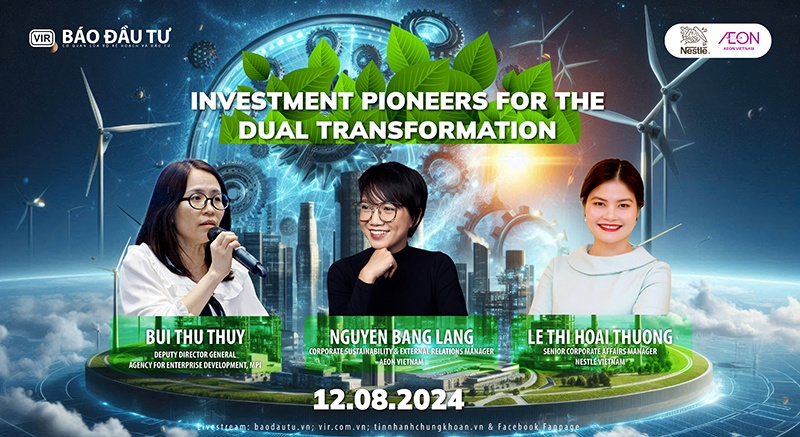Dual transformation an essential choice for business
More than $18 billion in foreign direct investment (FDI) capital poured into Vietnam in the first seven months of 2024, representing an almost 11 per cent increase compared to the same period last year, according to data from the Foreign Investment Agency under the Ministry of Planning and Investment (MPI).
 |
Yun Liu, ASEAN economist at HSBC, commented, “We continue to highly assess Vietnam’s prospects for attracting FDI in the medium and long term based on the investment portfolios of investors in the region, as well as from Europe.”
Statistics for the year to date show that FDI into Vietnam has increased both in terms of registered capital and the number of projects. The average investment capital scale has reached over $5.9 million per project, higher than the $4.9 million per project during the same period.
The advantage of having 16 free trade agreements (FTAs) with over 60 countries and territories is significantly supporting Vietnam in wooing more businesses for investment and export. According to data from the Ministry of Industry and Trade, export turnover to Vietnam’s FTA partners accounts for approximately 65 per cent of the country’s total.
At present, Vietnam is also striving to improve the business environment, with the introduction of incentives to develop suitable economic models, through strong commitments to promote dual transformation.
At a press conference to unveil a digital transformation report held by the MPI’s Agency for Enterprise Development and the German Development Agency several months ago, the agency’s deputy director Nguyen Duc Trung noted that the impact of global issues such as climate change and environmental resource depletion has posed many challenges for businesses, but has also provided motivation for businesses to transition to more sustainable business models.
“Recognising this essential trend, Vietnam sees green transformation along with digital transformation and innovation as an objective requirement, a strategic choice, and a top priority for rapid and sustainable development, moving from a brown economy to a sustainable green economy,” Trung said. According to Dr. Chu Duc
Hoang, office head of the National Technology Innovation Fund under the Ministry of Science and Technology, initiatives revolve around three main pillars: increasing productivity and sustainable economic efficiency, enhancing resilience and adaptation to climate change, and minimising or eliminating greenhouse gas emissions to the maximum extent.
“Digital transformation in green economic development involves applying digital technologies to the economic development, helps increase productivity, improve information processing capabilities, and to minimise negative impacts on the environment and ecosystems. It’s seen as a catalyst to accelerate the greening process of many businesses,” Hoang said.
In Vietnam, the digital economy and the green economy are among the essential trends and the path for Vietnam to make breakthroughs, aiming for sustainable development and to become a high-income country by 2045.
He further stated that the application of technologies such as AI, blockchain, and the Internet of Things (IoT) in digitising the economy creates new industries and business models and contributes to the transition to a low-carbon economy, reducing costs and resource consumption in the production and business processes.
Some businesses have achieved success by applying new technologies and reaping higher benefits in both business results and environmental emission reductions.
VinFast has successfully developed an electric car manufacturing plant using automation, robotics, and digital simulation. Meanwhile, Vinamilk applies IoT and big data technology in quality monitoring; Nestlé Vietnam applies technology to promote sustainable coffee farming; and retailer AEON Vietnam has focused on driving digital transformation towards green consumption.
Chairman of the Founding Council of Vietnam Software and IT Services Association Truong Gia Binh noted, “Vietnam needs to pioneer in developing the fields of AI, semiconductor chips, and smart electric vehicles to exploit the potential of the digital-green transformation.”
He cited the World Bank’s 2023 report on the dual transformation trend and pointed out that Vietnam held 15 per cent of the nearly 500 green patents in emerging markets, only behind Malaysia and Thailand.
Associate Prof. Vu Minh Khuong, lecturer at the Lee Kuan Yew School of Public Policy, National University of Singapore, said, “Without transitioning from the old growth model to a green growth model, Vietnam’s economy will find it challenging to take off. Vietnam’s competitiveness in attracting investment and exports will diminish, leading to the loss of major orders.”
Khuong also pointed out the challenges that Vietnam must face on the path towards green growth. “Vietnam is very determined to transition to a green economy through the issuance of many documents and directives in a short period of time. However, the implementation process is still slow and lacks a comprehensive strategy. The legal framework in Vietnam is still complex, affecting investors and businesses actively seeking a path to sustainable growth,” Khuong said.
 |
What the stars mean:
★ Poor ★ ★ Promising ★★★ Good ★★★★ Very good ★★★★★ Exceptional
Related Contents
Latest News
More News
- $100 million initiative launched to protect forests and boost rural incomes (January 30, 2026 | 15:18)
- Trung Nam-Sideros River consortium wins bid for LNG venture (January 30, 2026 | 11:16)
- Vietnam moves towards market-based fuel management with E10 rollout (January 30, 2026 | 11:10)
- Envision Energy, REE Group partner on 128MW wind projects (January 30, 2026 | 10:58)
- Vingroup consults on carbon credits for electric vehicle charging network (January 28, 2026 | 11:04)
- Bac Ai Pumped Storage Hydropower Plant to enter peak construction phase (January 27, 2026 | 08:00)
- ASEAN could scale up sustainable aviation fuel by 2050 (January 24, 2026 | 10:19)
- 64,000 hectares of sea allocated for offshore wind surveys (January 22, 2026 | 20:23)
- EVN secures financing for Quang Trach II LNG power plant (January 17, 2026 | 15:55)
- PC1 teams up with DENZAI on regional wind projects (January 16, 2026 | 21:18)

 Tag:
Tag:




















 Mobile Version
Mobile Version